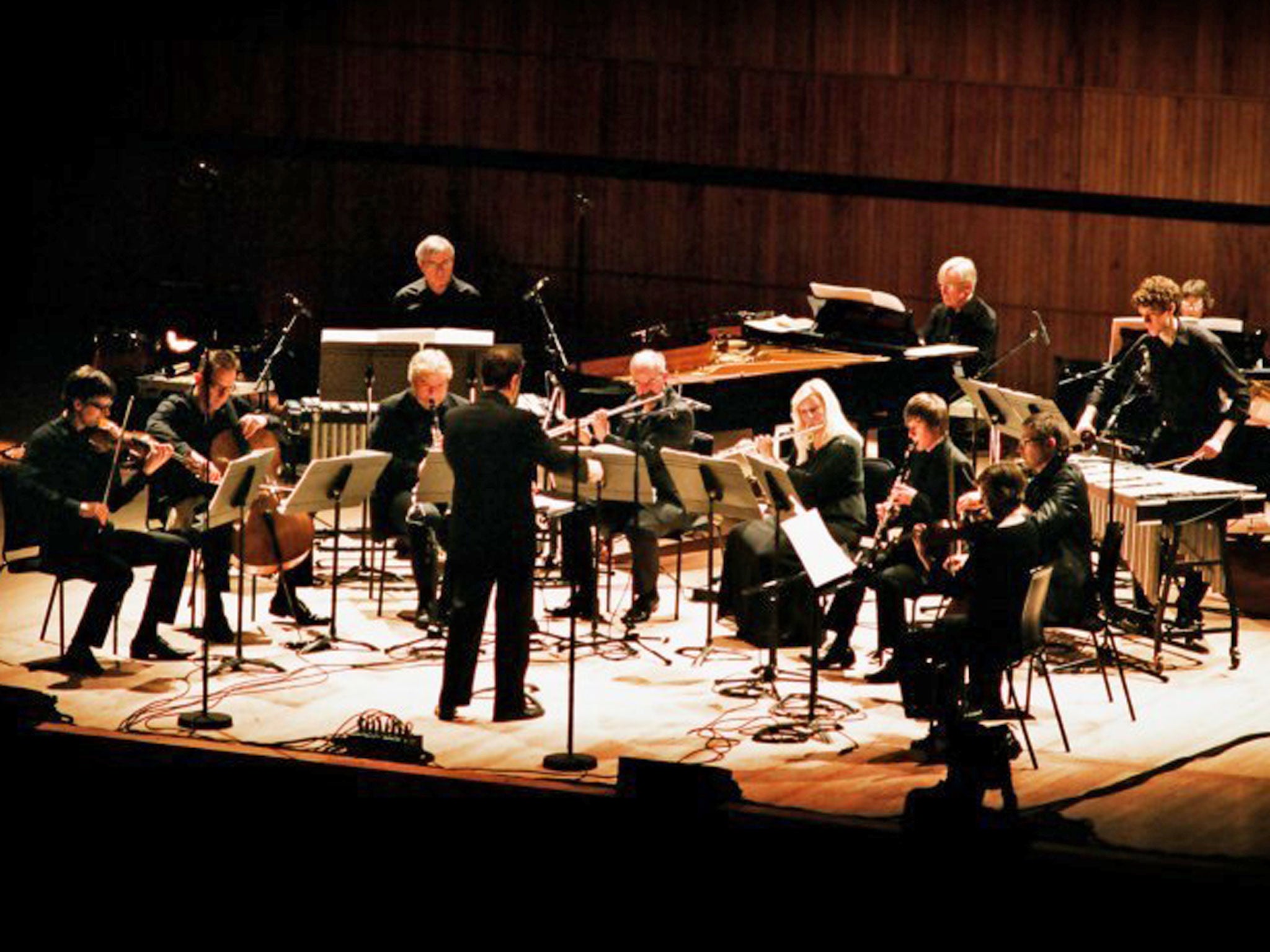Classical review: Steve Reich/London Sinfonietta - Turn down the Radiohead, Steve
There is much to like and admire about the great minimalist, but he should have looked elsewhere for pop inspiration

The music of Steve Reich, at its greatest, describes a kind of ecstasy. From the astral glow of Music for 18 Musicians and Music for Mallet Instruments, Voices and Organ to the heat-haze of Drumming and Six Marimbas, the darting flames of love and grief in Daniel Variations and Tehillim, the complex inflexions of Different Trains and The Cave, the Shaker simplicity of Clapping Music and the dazzling purity of Cello Counterpoint and Piano Phase, the 76-year-old composer creates something vast and extraordinary from minute changes of rhythm and timbre, Beethovenian in its effect, though not in its vernacular. The soundworld may be Reich's alone but it's a formula to which any three-chord, three-minute songwriter might aspire: to alter the listener, to sharpen, open, provoke and enhance.
Along with the hits, there are Reich B-sides, works that are never less than engaging but somehow miss greatness. Premiered last week in London, Birmingham, Brighton and Glasgow, and inspired by a chance meeting with Radiohead's Jonny Greenwood, Radio Rewrite falls into this class, as do 2 x 5 and Double Sextet, which framed the new work in London Sinfonietta's programme. After the reliable pleasure of Clapping Music, performed by Reich and David Hockings, and the caffeinated perfection of Mats Bergström's reading of Electric Counterpoint (less a description of Heaven than a description of Heaven on Earth, all gleam and streamlined comfort, like a high-range hybrid car on a smooth country road on a warm autumn day), a sense of routine set in.
The landscape of 2 x 5 is urban, a thing of glass and concrete and steel, but viewed as if from an air-conditioned interior. London Sinfonietta's live quintet of electric guitars, bass, drum and piano was as disciplined as its prerecorded counterpart, the bass's closing octave leaps a curiously flamboyant flourish in an otherwise muted work. In its instrumentation, Radio Rewrite acts as a bridge between 2 x 5 and Double Sextet. The latter's mirrored consorts of strings, woodwind and tuned percussion present a more enigmatic face than Radio Rewrite, though this could be the result of listening out for the doomy chord-changes and fey melodic fragments of Radiohead's songs "Everything in its Right Place" and "Jigsaw Falling Into Place".
An abrasive, shofar-like clarinet line and the shuddering muddying of harmony from vibraphones provided interest in a rather bland sequence of five movements. Reich's technique remains a marvel. Nonetheless, after nearly 50 years of favouring the Early French polyphonists, modal jazz and African music as his influences, unmoved alike by disco, punk, techno, krautrock or Motown, Radiohead seems an odd place for him to start a relationship with pop: too thin, too drab, too short on ecstasy and heat.
Berlin was the focus of last weekend's The Rest is Noise events, which saw an evening of cabaret from members of the Berlin Philharmonic (Queen Elizabeth Hall, London **). From the no-drinks rule to the search-engine statistics narrated by actor Robert Gallinowski – who knew there were more than 70 newspapers in 1920s Berlin? – the ensemble seemed intent on removing the faintest trace of danger and decadence from their programme. While singer Dagmar Manzel gamely transformed herself from shop-girl to vamp, grieving mother to crone, Pierrot to sexually frustrated housewife and battered woman, the players sat stolidly on their chairs, delivering ersatz jazz by composers such as Arnold Schoenberg and Hanns Eisler with faultless precision. Though Gallinowski's readings of poems by Yvan Goll and his contemporaries peeled back the veneer of hedonism to reveal the desperation behind it, the thesis was muddy, the relationship between high art and low life ill-defined. Prokofiev's Sonata in D for flute and piano (written in the Urals in 1942) has nothing to do with Berlin cabaret, however beautifully it is played.
Vladimir Jurowski's performance of The Threepenny Opera (Royal Festival Hall, London ****) with the London Philharmonic Orchestra had more tang and grit, and, pace Radio Rewrite, more Beethovenian ambition. Brecht's brutal lyrics (required listening in an age when we are being encouraged to hate and fear the poor) and Weill's sour-sweet orchestrations registered vividly in Ted Huffman's icily stylised semi-staging.
Actor Max Hopp narrated, singing the "Ballad of Mackie Messer" with vulpine charm, as Mark Padmore's guarded, unknowable Macheath drifted from sweetheart to sweetheart to brothel and to jail, breaking – or bruising – the hearts of Polly Peachum (Allison Bell), Lucy Brown (Gabriela Istoc) and Jenny (Meow Meow). Old hands Dame Felicity Palmer (Mrs Peachum) and Sir John Tomlinson (J J Peachum) proved that classical musicians can straddle cabaret and the concert hall. Best in show? The LPO's indefatigable Catherine Edwards, multitasking on celesta, harmonium and piano.
Critic's Choice
Canada's ARC Ensemble makes its debut at London's Wigmore Hall today with a concert of "degenerate music", including Mendelssohn's unfinished Violin Sonata, Szymon Laks's Piano Quintet and Paul Ben-Haim's Piano Quartet. Also tonight, Oliver Knussen conducts Birmingham Contemporary Music Group in a feisty programme of works by Ruggles, Ives, Cage, Carter, and others, at the CBSO Centre, Birmingham.
Join our commenting forum
Join thought-provoking conversations, follow other Independent readers and see their replies
0Comments